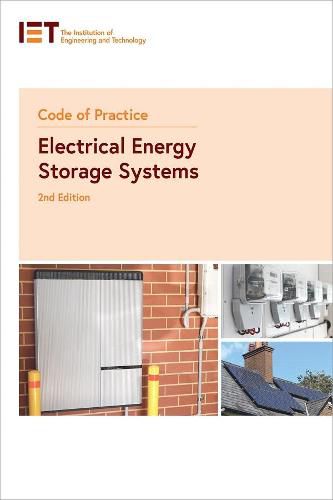Readings Newsletter
Become a Readings Member to make your shopping experience even easier.
Sign in or sign up for free!
You’re not far away from qualifying for FREE standard shipping within Australia
You’ve qualified for FREE standard shipping within Australia
The cart is loading…






Electrical Energy Storage Systems (EESS) provide storage of electrical energy so that it can be used later. EESS may be installed for a variety of reasons, for example increasing the ‘self-consumption’ of buildings fitted with renewable energy systems; arbitrage services; ancillary services and providing a back-up or alternative power supply.
This Code of Practice looks at EESS applications and provides information for practitioners to safely and effectively specify, design, install, commission, operate and maintain a system.
The scope of this Code of Practice includes EESS intended for fixed installation applications including:
individual dwellings; commercial applications, including multi-occupancy buildings and multi-occupancy residential buildings; industrial applications
and covers:
electrochemical energy storage systems in electrical installations; integration into low voltage (LV) power systems (AC and DC) and systems aligned with existing standards, regulations and guidance.
This second edition of the Code of Practice builds on the first edition and provides the most up-to-date guidance to help support the growth of the electrical energy storage market. It has been updated to take account of developments in the industry, progress in standardization and address emerging technical challenges such as arc flash risk assessments.
$9.00 standard shipping within Australia
FREE standard shipping within Australia for orders over $100.00
Express & International shipping calculated at checkout
Electrical Energy Storage Systems (EESS) provide storage of electrical energy so that it can be used later. EESS may be installed for a variety of reasons, for example increasing the ‘self-consumption’ of buildings fitted with renewable energy systems; arbitrage services; ancillary services and providing a back-up or alternative power supply.
This Code of Practice looks at EESS applications and provides information for practitioners to safely and effectively specify, design, install, commission, operate and maintain a system.
The scope of this Code of Practice includes EESS intended for fixed installation applications including:
individual dwellings; commercial applications, including multi-occupancy buildings and multi-occupancy residential buildings; industrial applications
and covers:
electrochemical energy storage systems in electrical installations; integration into low voltage (LV) power systems (AC and DC) and systems aligned with existing standards, regulations and guidance.
This second edition of the Code of Practice builds on the first edition and provides the most up-to-date guidance to help support the growth of the electrical energy storage market. It has been updated to take account of developments in the industry, progress in standardization and address emerging technical challenges such as arc flash risk assessments.